Geneva, Switzerland
Governments of the world re-affirmed their commitment to halting pangolin trafficking this week in Geneva at the 18th meeting of the Conference of the Parties (CoP18) to the Convention on International Trade in Endangered Species of Wild Fauna and Flora (CITES). By committing to increasing focus on the conservation of wild pangolins, and continuing critical monitoring of pangolin trade and trafficking, the world’s governments once again spoke with one voice to declare that they will not tolerate pangolin trafficking, and they will work together to halt the grim decline of pangolins.
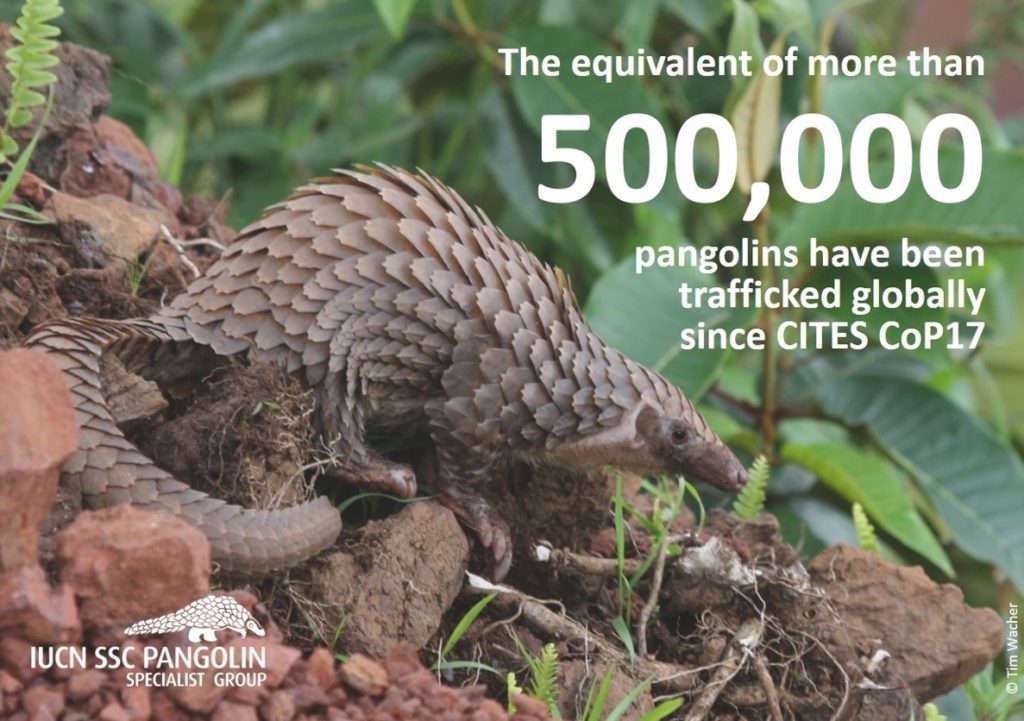
The PSG estimates that the equivalent of more than 500,000 pangolins have been trafficked globally between CITES CoP17 and CoP18, a statistic used on PSG outreach materials at CITES CoP18. White-bellied pangolin, photo credit: Tim Watcher.
It has been just three short years since the world’s governments unified at CITES CoP17 in Johannesburg, South Africa, to list the eight pangolin species on Appendix-I of CITES. Appendix-I is the strictest level of international protection under CITES and prohibits commercial international trade in wild specimens of species. The most recent trafficking analysis conducted by the IUCN SSC Pangolin Specialist Group (PSG) shows that since CoP17, governments have stood by their word. According to this recent analysis, more than 333 illegal shipments have been halted by the law enforcement agencies of more than 31 governments since October 2016. We applaud the efforts of these governments to halt illegal shipments.
Now more than ever, given the severity of continued pangolin trafficking, evidence shows that appropriate international protection is only the starting point on the long road to ensuring the conservation of pangolins. While we celebrate the successes of effective law enforcement, we know that increased enforcement capacity is needed to uncover the true magnitude of trafficking, and critically to address it. Importantly, there is also an urgent need to consider the impact of ongoing trafficking on populations of the eight species of pangolin in the wild.
Conserving wild pangolins will require a sustained, multi-pronged approach. Critical to the way forward is the development of ecological monitoring programs to estimate the distribution and abundance of wild pangolins. An important role of the PSG is providing technical support to the CITES Parties (aka government signatories to the treaty). As part of this responsibility, PSG representatives participated in CITES CoP18 in Geneva and shared the latest evidence and information on pangolin trafficking and conservation, as well as findings from the 2018 workshop in Cambridge, U.K to develop ecological monitoring methods for pangolins, which was generously funded by the United States Fish and Wildlife Service.
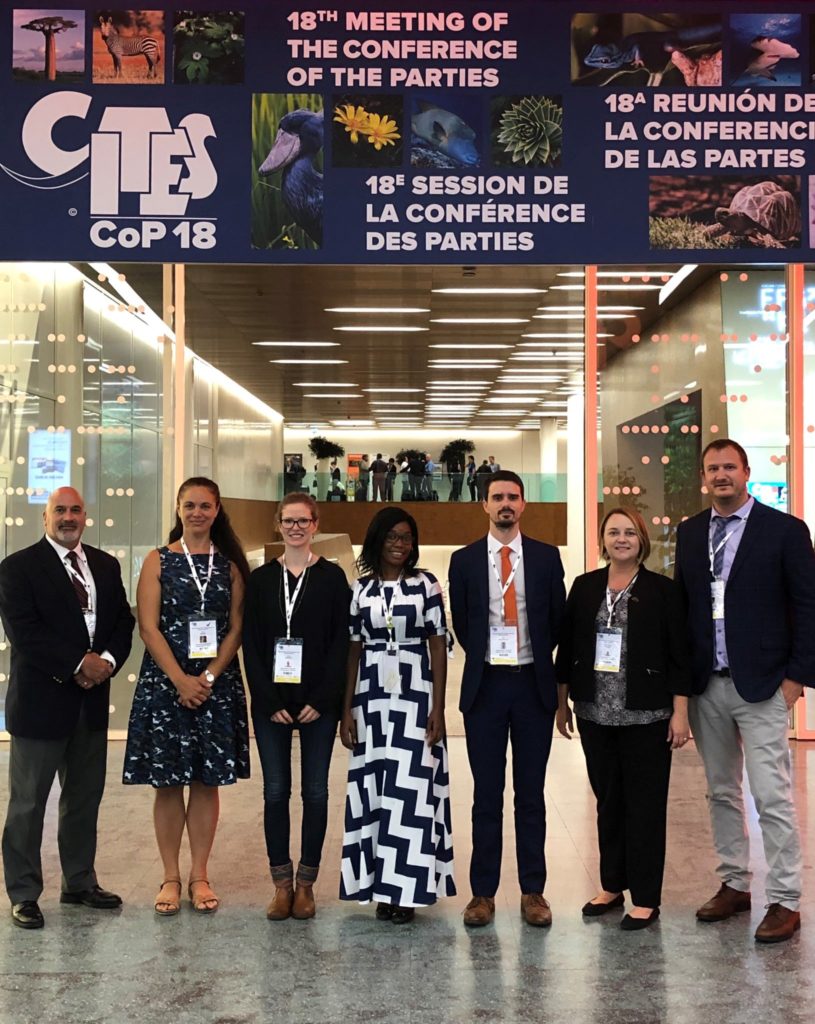
Representatives of the IUCN SSC Pangolin Specialist Group (PSG) and guests participated in the CITES CoP18 meeting and shared the latest information and evidence on pangolin trafficking and conservation. From left to right: Salvatore Amato, USAID; Dr. Dana Morin, Mississippi State University; Sarah Heinrich, University of Adelaide; Carla Louise Mousset Moumbolou, Agence Nationale des Parcs Nationaux de Gabon; Dr. Dan Challender, PSG Chair; Keri Parker, PSG Vice Chair; Dr. Matt Shirley, Florida International University. Photo credit: Amelia Meier.
These findings were shared at a side event which included presentations from Dr. Dan Challender (PSG Chair), Keri Parker (PSG Vice-Chair), PSG Member Carla Louise Mousset Moumbolou (Agence Nationale des Parcs Nationaux de Gabon), and special guests Dr. Dana Morin (Mississippi State University) and Dr. Matt Shirley (Florida International University). The PSG was happy to share the event stage with Law Enforcement Specialist Salvatore Amato from USAID, who presented a new suite of tools created to support stakeholders in identifying pangolin species in illegal trade. Findings from the Cambridge workshop were also submitted as a CITES CoP18 information document by the United States government.
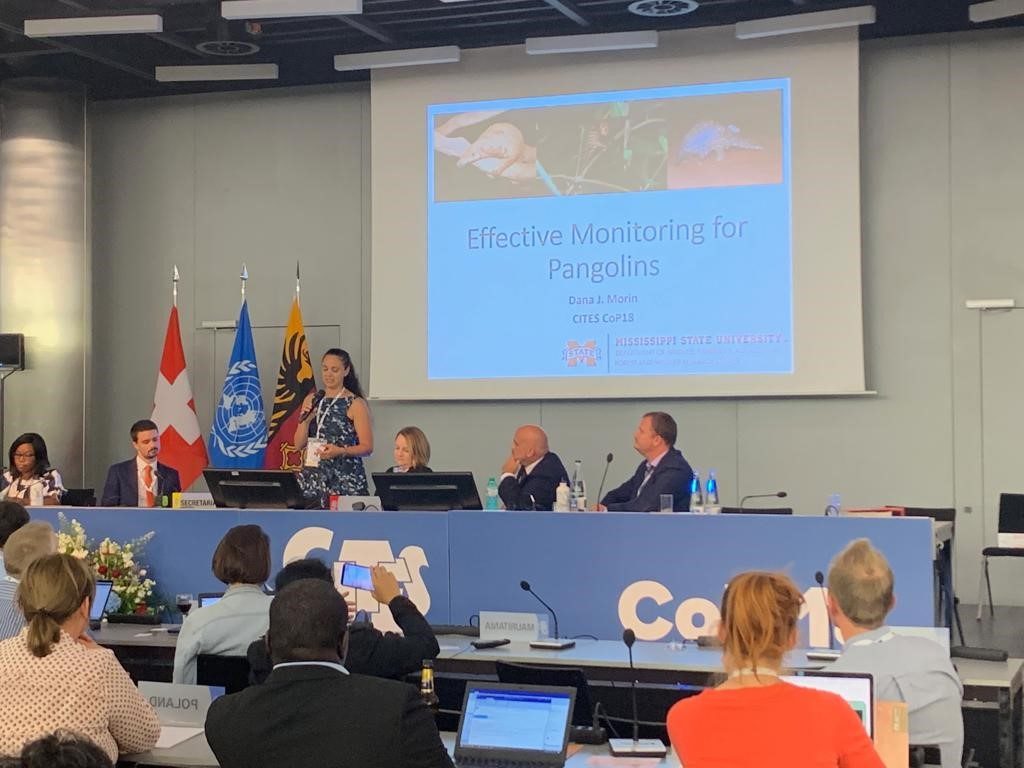
PSG representatives and guests present information on pangolin trafficking and monitoring methods at CITES CoP18 in Geneva, Switzerland. Photo credit: Amelia Meier.
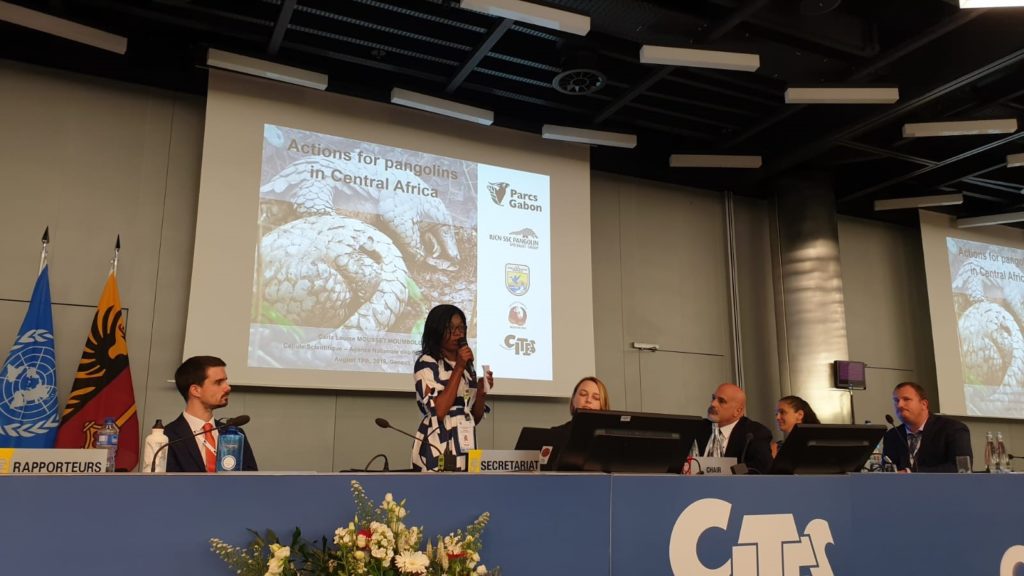
PSG representatives and guests present the latest information on pangolin conservation at CITES CoP18 in Geneva, Switzerland. Photo credit: Helen O’Neill.
Prepared with this latest evidence and information, the CITES Parties subsequently made several decisions critical to pangolin conservation. Under CoP18 agenda item 75 (Pangolins), the Parties agreed by consensus* to adopt a number of Decisions. Importantly, pangolin range states are encouraged to take urgent steps to develop and implement in situ pangolin management and conservation programs, including population assessments, and report on their related activities to the CITES Secretariat. Additionally, the Parties decided to continue critical global oversight of pangolin trade and trafficking by assigning the CITES Secretariat to work with pangolin experts and range states to prepare a report on the national conservation status of pangolin species, legal and illegal trade in pangolins, stocks of specimens of pangolins and stockpile management, and enforcement issues. This report continues the consultation and monitoring process that stemmed from CoP17, and will be prepared for the CITES Animals and Standing Committees so that they can make recommendations to CoP19.
Under CoP18 agenda items 49.1 and 49.2 (Implications of the transfer of a species to Appendix I), the Parties together clarified the implementation of Appendix I, and resolved by consensus** that after a species is transferred from one CITES Appendix to another (such as pangolins being transferred from Appendix II to I), governments will evaluate whether or not to authorize trade according to the appendix in which the species is listed at the time of export, rather than when the specimens in question were removed from the wild. This decision has significant implications for pangolins because without this clarification large stockpiles of pangolin scales that were compiled before the Appendix-I listing became effective in January 2017 may have later been authorized as Appendix-II specimens for commercial trade purposes. Given the impossibility of accurately differentiating pangolin specimens removed from the wild before the Appendix-I listing from those acquired afterwards, especially scales, this may have created complex enforcement challenges and placed additional pressure on remaining pangolin populations, especially the tropical African species.
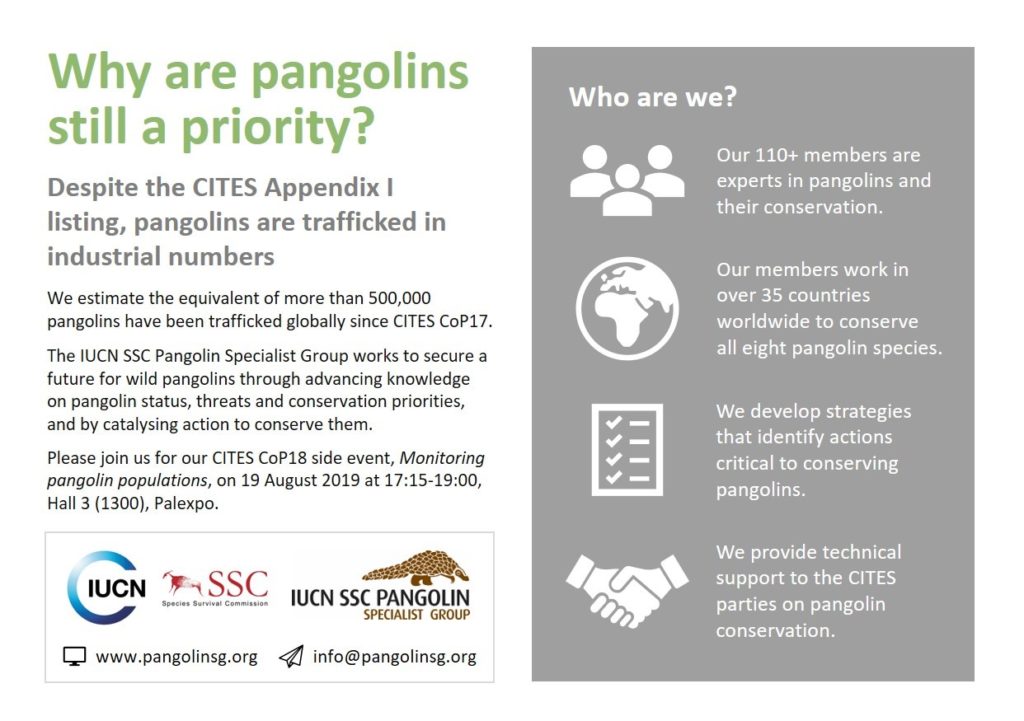
Back view of the PSG outreach flyer and side event invitation distributed at CITES CoP18 in Geneva, Switzerland.
Perhaps the most important outcome for the PSG Delegation to CoP18 was the increased visibility of the group and its work to the CITES Parties. Multiple Parties included evidence shared in our outreach materials and the side event in their interventions during Committee discussions, and numerous connections were forged, especially related to opportunities for conservation planning. We take our role of developing the best possible information and technical guidance on pangolin conservation very seriously, and we stand ready to assist the CITES Parties in their implementation of the decisions of CoP18 as they work globally to conserve the eight pangolin species.
Keri Parker
Vice Chair, IUCN SSC Pangolin Specialist Group
*For details, see the summary record of the twelfth session of CoP18 Committee II, item 75.
**The CITES Parties agreed by consensus to the proposals outlined in document 49.1, and noted the recommendations put forward in 49.2. For details, see the summary record of the tenth session of CoP18 Committee II, item 49.

